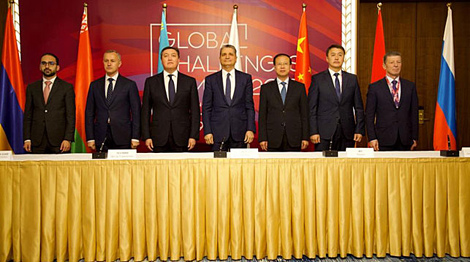Opinions & Interviews
EAEU-China agreement to enable West-East digital transport and logistics corridor

MOSCOW, 17 May (BelTA) – The agreement on trade and economic cooperation between the Eurasian Economic Union and China will enable the establishment of a digital transport and logistics corridor West-East, First Deputy Prime Minister of Belarus Vasily Matyushevsky said in Astana on 17 May after the signing ceremony of the document, BelTA learned from the press service of the Eurasian Economic Commission (EEC).
Vasily Matyushevsky underlined that Belarus consistently supported integration at different levels and at different speeds, economic cooperation and integration of integrations between the EU, EAEU and China, which are seen as an instrument to respond to global challenges. Such integration can be propped by a global infrastructure project. “Our task is to develop an efficient transport and logistics corridor. In our view, we can maximize the benefits of the project if we set up digital transport and logistics corridors, first of all, West-East corridors,” he added.
Belarus’ first vice-premier noted that Belarus and China already implemented the project to set up the China-Belarus Industrial Park as part of the Belt and Road Initiative. This park will be a global hub with digitalization elements. The European hub also made part of it. Thus, this creates preconditions for integration of integrations, Vasily Matyushevsky believes.
The agreement was signed by Chairman of the Board of the Eurasian Economic Commission Tigran Sargsyan, First Deputy Prime Minister of Belarus Vasily Matyushevsky, Armenian Deputy Prime Minister Tigran Avinyan, Kazakhstan’s First Deputy Prime Minister Askar Mamin, Deputy Prime Minister Zamirbek Askarov of Kyrgyzstan, Russian Acting Deputy Prime Minister Dmitry Kozak, and China International Trade Representative and Vice Minister of Commerce Fu Ziying.
Tigran Sargsyan underlined that all the estimations and reasons that underpinned the elaboration of the agreement proved right. “The negotiating process showed that all the topics we raised were relevant and that our countries are interested in deepening and expanding cooperation with China,” he said. Trade between the EAEU member states and China exceeded $100 billion in 2017, while the export from the EAEU to China rose by 40%.
 The agreement opens up new opportunities for economic operators of the EAEU participating states. “By showing our comparative advantages in this competitive environment, we give them very clear interaction guidelines, although this is not a non-preferential agreement. New guidelines set out in this document will boost economic growth of our countries and materialize our strategic advantages,” Tigran Sargsyan noted.
The agreement opens up new opportunities for economic operators of the EAEU participating states. “By showing our comparative advantages in this competitive environment, we give them very clear interaction guidelines, although this is not a non-preferential agreement. New guidelines set out in this document will boost economic growth of our countries and materialize our strategic advantages,” Tigran Sargsyan noted.
Kazakhstan’s first deputy prime minister made an emphasis on cooperation with China in transport infrastructure development. “In recent years Kazakhstan has carried out a large-scale upgrade of its transport infrastructure. This pertains to road construction, too. The corridor sector Western Europe-Western China was completed two years ago. Now we are waiting for the Russian part of the corridor to be finished, so that it will become one corridor connecting Western China and Western Europe via our countries,” Askar Mamin said. Another cooperation area is improvement of railway infrastructure. He noted that Kazakhstan has been cooperating with Russia and Belarus in this field within the framework of the EAEU. He expressed hope that Kyrgyzstan and Armenia will join the effort.
“Coordinated efforts of our countries and extended international and multi-format cooperation of the union with third countries is the future we should strive for,” Armenian Deputy Prime Minister Tigran Avinyan noted. He believes that integration in the region is expanding its scale and Europe can join the process.
Deputy Prime Minister Zamirbek Askarov of Kyrgyzstan stated that China is an important investor in Kyrgyzstan. It has been successfully implementing projects in the country for many years already. There are over 400 companies with China’s participation in Kyrgyzstan. Key cooperation area is industry, including services sector, processing and mining industry and agriculture.
The EAEU-China agreement was hailed as an important milestone by Dmitry Kozak. In his view, the agreement provides for cooperation tools that allow accommodating interests of the union and its participating states to the full, as well as interests of business. The document secures transparency of regulations at national and supranational levels. It encompasses technical, sanitary and phytosanitary guidelines and interaction rules in customs administration.
China International Trade Representative and Vice Minister of Commerce Fu Ziying noted that five years ago Xi Jinping came forward with the Belt and Road Initiative, and now a multilateral agreement was signed amidst de-globalization and protectionism. Joint work within the framework of the Belt and Road Initiative and the EAEU is a key area of cooperation. It will be very instrumental for simplifying trading procedures between the countries and will contribute to economic growth and higher living standards of people, Fu Ziying underlined.







 print version
print version make home page
make home page add to bookmarks
add to bookmarks

